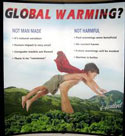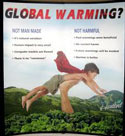 The ramifications of last week’s leak of internal documents from the Heartland Institute — the US lobby group up to its neck in organised climate denial in the US, Canada, New Zealand, Australia and perhaps elsewhere — continue to make news. The Sydney Morning Herald reports that Heartland money was used to fund Aussie climate denial campaigners in 2009 and 2010, with funds channelled through the “American Climate Science Coalition” — a member of the coterie of climate “science” coalitions spun off from the New Zealand original with Heartland funding. Heartland’s charitable status in the US — which allows donors to the group to claim a 30% tax deduction (effectively a tax-payer subsidy of Heartland activities) — is being called into question as a result of the latest Mashey report into the links between Fred Singer and Heartland, and the dodgy nature of Heartland’s overseas grants. There have also been calls for some of Heartland’s large corporate donors to cease providing financial support for an organisation so steeped in climate denial.
The ramifications of last week’s leak of internal documents from the Heartland Institute — the US lobby group up to its neck in organised climate denial in the US, Canada, New Zealand, Australia and perhaps elsewhere — continue to make news. The Sydney Morning Herald reports that Heartland money was used to fund Aussie climate denial campaigners in 2009 and 2010, with funds channelled through the “American Climate Science Coalition” — a member of the coterie of climate “science” coalitions spun off from the New Zealand original with Heartland funding. Heartland’s charitable status in the US — which allows donors to the group to claim a 30% tax deduction (effectively a tax-payer subsidy of Heartland activities) — is being called into question as a result of the latest Mashey report into the links between Fred Singer and Heartland, and the dodgy nature of Heartland’s overseas grants. There have also been calls for some of Heartland’s large corporate donors to cease providing financial support for an organisation so steeped in climate denial.
Tag: Mashey
The real Climategate: Heartland’s hypocrisy on display
 It’s been a bad week for the Heartland Institute — the US lobby group recently shown to have funded New Zealand climate denialists. Documents leaked this week expose Heartland’s fund-raising and climate strategies to the cold light of day, and a major new piece of research by John Mashey demonstrates that Heartland has been acting outside of the rules governing the tax-exempt status it claims for itself.
It’s been a bad week for the Heartland Institute — the US lobby group recently shown to have funded New Zealand climate denialists. Documents leaked this week expose Heartland’s fund-raising and climate strategies to the cold light of day, and a major new piece of research by John Mashey demonstrates that Heartland has been acting outside of the rules governing the tax-exempt status it claims for itself.
Documents relating to a Heartland board meeting held in January were sent to a number of bloggers earlier this week, and have been made available by DeSmogBlog. The papers give a very full account of Heartland’s budget and plans for 2012, right down to individual staff salaries, and provide details of funding streams from players big and small. The largest — described as the “anonymous donor” — provided Heartland with $8.6 million over 2007-11 for its climate campaigns (see pps 20 and 21 of this document).
Key points from the documents:
- Heartland plans to create a “Global Warming Curriculum for K-12 Schools” that “isn’t alarmist or overtly political”, and plans to pay Dr David Wojick $25,000 a quarter to develop the materials.
- Heartland is planning to fund Fred Singer’s Not the IPCC project to the tune of $1.5 million over 2010-13, and is budgeting monthly payments of $11,600 to Craig Idso, $5,000 to Singer and $1,667 to Bob Carter during 2012.
- Anthony Watts (of µWatts fame) is being funded to the tune of $88,000 to develop a web site featuring US temperature data.
- Current funders include tobacco companies, fossil fuel interests, and even Microsoft.
Heartland claims the documents were stolen, and that one — relating to their strategy on climate denial — was faked, even though the main points in that “confidential memo” are corroborated by the other documents. The Heartland response includes threats of legal action against web sites and media carrying stories based on the documents, and says:
…honest disagreement should never be used to justify the criminal acts and fraud that occurred in the past 24 hours. As a matter of common decency and journalistic ethics, we ask everyone in the climate change debate to sit back and think about what just happened.
Those persons who posted these documents and wrote about them before we had a chance to comment on their authenticity should be ashamed of their deeds, and their bad behavior should be taken into account when judging their credibility now and in the future.
Back in 2009, when the emails stolen from the Climatic Research Unit at the University of East Anglia first hit the web, Heartland president Joseph Bast wrote:
The release of these documents creates an opportunity for reporters, academics, politicians, and others who relied on the IPCC to form their opinions about global warming to stop and reconsider their position. The experts they trusted and quoted in the past have been caught red-handed plotting to conceal data, hide temperature trends that contradict their predictions, and keep critics from appearing in peer-reviewed journals. This is new and real evidence that they should examine and then comment on publicly.
The hypocrisy burns…
Meanwhile, the news that Bob Carter is retained by Heartland to undermine the work of mainstream science through the NIPCC is making waves in Australia (Graham Readfearn, SMH), but hasn’t yet been picked up in New Zealand. Carter’s role as a “science advisor” to the Heartland funded NZ Climate Science Coalition and its ICSC spin-off, as well as to Nigel Lawson’s secretive Global Warming Policy Foundation raises serious questions about just how lucrative denial can be, as well as illuminating the international web of climate denial.
Continue reading “The real Climategate: Heartland’s hypocrisy on display”
Put it there pal: the real story of Chris de Freitas and Climate Research
 The release of another batch of emails from the stash stolen a couple of years ago from the Climatic Research Unit at the University of East Anglia may not have gained much attention in global media, but there has been a great deal of huffing and puffing at sceptic blogs such as µWatts and Climate Audit. Watts trumpets this news, for example:
The release of another batch of emails from the stash stolen a couple of years ago from the Climatic Research Unit at the University of East Anglia may not have gained much attention in global media, but there has been a great deal of huffing and puffing at sceptic blogs such as µWatts and Climate Audit. Watts trumpets this news, for example:
BOMBSHELL An absolutely disgusting string of communications that shows the tribal attempt at getting an editor of a journal fired on made up issues – all because he allowed a publication that didn’t agree with “the Team”. This is ugly, disturbing, and wrong on every level.
Introducing a post copied from a New Zealand sceptic blog, given the headline The tribalistic corruption of peer review – the Chris de Freitas incident — Watts adds:
This is outright malicious interference with the scientific process, and it’s damned ugly. I can’t imagine anyone involved in professional science who could stand idly by and not condemn this.
Unfortunately for Watts and the anonymous (and low profile) NZ blogger who wrote the article, a new analysis by John Mashey of 700+ papers published at Climate Research reveals that the tribalism on display came from a cabal of sceptical scientists, with Auckland University academic Chris de Freitas safely shepherding their papers — however poor the science they contained — through peer pal review.
Continue reading “Put it there pal: the real story of Chris de Freitas and Climate Research”
Wegmangate: first blood
 Plagiarism by George Mason University professor Edward Wegman and his team — first revealed last year by John Mashey and Canadian blogger Deep Climate — has now been acknowledged by Computational Statistics and Data Analysis. The journal has retracted a paper (Social networks of author-coauthor relationships, by Said, Wegman et al, CSDA 2008) by Wegman’s co-author Yasmin Said and Wegman himself, citing — according to a report by Dan Vergano in USA Today — “evidence of plagiarism and complaints about the peer-review process”. Sections of the paper, itself based on the social networks section of the Wegman Report on the statistics of paleoclimate reconstructions, were copied and pasted from Wikipedia. It was rushed into print in a matter of a few days — extremely unusual in academic publishing.
Plagiarism by George Mason University professor Edward Wegman and his team — first revealed last year by John Mashey and Canadian blogger Deep Climate — has now been acknowledged by Computational Statistics and Data Analysis. The journal has retracted a paper (Social networks of author-coauthor relationships, by Said, Wegman et al, CSDA 2008) by Wegman’s co-author Yasmin Said and Wegman himself, citing — according to a report by Dan Vergano in USA Today — “evidence of plagiarism and complaints about the peer-review process”. Sections of the paper, itself based on the social networks section of the Wegman Report on the statistics of paleoclimate reconstructions, were copied and pasted from Wikipedia. It was rushed into print in a matter of a few days — extremely unusual in academic publishing.
Most interesting, however, is that Said et al seems to provide an example of an extremely rare beast: a self-refuting paper. Said, Wegman et al suggested that studies where scientists collaborated between institutions could be more liable to bias than papers where the “principal author tends to co-author papers with younger colleagues who were his students”. Said was a PhD student in Wegman’s department.
For the full story, refer to USA Today (original and follow-up), Deep Climate (one and two), with more at Deltoid, and especially at Stoat, where WMC provides an excellent dog/homework cartoon. Meanwhile, the world awaits GMU’s much delayed determination of the original complaints against Wegman and his report made last year…
Wegman investigated for plagiarism, “skepticgate” looms
 George Mason University has confirmed that it is investigating allegations of plagiarism by Professor Edward Wegman, author of the hockey stick hatchet job “Wegman Report”. According to USA Today, the investigation began earlier this year after a letter of complaint from Raymond Bradley (as in Mann, Bradley and Hughes) whose textbook Paleoclimatology: Reconstructing Climates of the Quaternary was extensively copied and crudely altered in the report to Congress. USA Today credits the investigation by Canadian blogger Deep Climate and the extensive report on errors in Wegman’s document compiled by John Mashey (covered here last month). Wegman declined to comment, but has confirmed that litigation is involved. Informed speculation suggests that this may be related to copyright issues — likely to be a problem for anyone who lifts 30% of a report from other people’s work. The story has also been picked up by the Washington Post, and Andy Revkin at Dot Earth has dubbed the affair SkepticGate. This scandal may be about to go mainstream — and not before time.
George Mason University has confirmed that it is investigating allegations of plagiarism by Professor Edward Wegman, author of the hockey stick hatchet job “Wegman Report”. According to USA Today, the investigation began earlier this year after a letter of complaint from Raymond Bradley (as in Mann, Bradley and Hughes) whose textbook Paleoclimatology: Reconstructing Climates of the Quaternary was extensively copied and crudely altered in the report to Congress. USA Today credits the investigation by Canadian blogger Deep Climate and the extensive report on errors in Wegman’s document compiled by John Mashey (covered here last month). Wegman declined to comment, but has confirmed that litigation is involved. Informed speculation suggests that this may be related to copyright issues — likely to be a problem for anyone who lifts 30% of a report from other people’s work. The story has also been picked up by the Washington Post, and Andy Revkin at Dot Earth has dubbed the affair SkepticGate. This scandal may be about to go mainstream — and not before time.
More coverage at Deep Climate, Things Break, Rabett Run and The Cost Of Energy.
